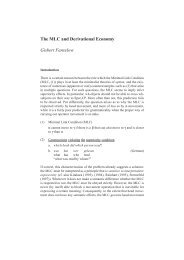Connectionist Modeling of Experience-based Effects in Sentence ...
Connectionist Modeling of Experience-based Effects in Sentence ...
Connectionist Modeling of Experience-based Effects in Sentence ...
Create successful ePaper yourself
Turn your PDF publications into a flip-book with our unique Google optimized e-Paper software.
Chapter 2 Issues <strong>in</strong> Relative Clause Process<strong>in</strong>g<br />
(14) a. Mandar<strong>in</strong> SRC with demonstrative:<br />
[Zheige [ei yaoq<strong>in</strong>g fuhao dei] guanyuani] x<strong>in</strong>huaibugui.<br />
This-CL <strong>in</strong>vite tycoon gen <strong>of</strong>ficial have bad <strong>in</strong>tentions<br />
’The <strong>of</strong>ficial who <strong>in</strong>vited the tycoon has bad <strong>in</strong>tentions.’<br />
b. Passivized Mandar<strong>in</strong> ORC:<br />
[Bei fuhao yaoq<strong>in</strong>g ei dei] guanyuani x<strong>in</strong>huaibugui.<br />
bei tycoon <strong>in</strong>vite gen <strong>of</strong>ficial have bad <strong>in</strong>tentions<br />
’The <strong>of</strong>ficial who the tycoon <strong>in</strong>vited has bad <strong>in</strong>tentions.’<br />
If the Gap Assumption is correct and the reader is aware <strong>of</strong> the gap <strong>in</strong> the SRC, no<br />
difference <strong>in</strong> read<strong>in</strong>g time is predicted between the demonstrative condition and the one<br />
without zheige. As for the ORC, <strong>in</strong>sert<strong>in</strong>g the passivization marker should <strong>in</strong>crease the<br />
difficulty <strong>in</strong> the RC region <strong>in</strong> case the Storage Cost predictions are correct. The reason<br />
is that more syntactic heads would be stored <strong>in</strong> memory when an RC is predicted and<br />
not a ma<strong>in</strong> clause as assumed by Hsiao and Gibson. In short, under Hsiao and Gibson’s<br />
assumptions the zheige condition should have no effect, whereas the bei condition would<br />
<strong>in</strong>crease the difficulty on the ORC. The results showed an overall subject preference<br />
<strong>in</strong> the total read<strong>in</strong>g times. The preference was ma<strong>in</strong>ly found on the relativizer and<br />
the head noun (de N2). No effect was found on the RC region before the relativizer.<br />
This is consistent with L<strong>in</strong> and Bever (2006a). On the relativizer (and on the preced<strong>in</strong>g<br />
region, but not significantly) the SRC condition without the determ<strong>in</strong>er (SR-no-det) was<br />
easier than the condition with the determ<strong>in</strong>er (SR-det). This is not consistent with the<br />
Gap Assumption but with the Elided Subject Assumption. The Storage Cost hypothesis<br />
under the Elided Subject Assumption would predict less syntactic heads <strong>in</strong> the SR-no-det<br />
condition, s<strong>in</strong>ce not an RC but a ma<strong>in</strong> clause is expected. This confirms the prediction<br />
<strong>of</strong> the corpus frequency data. The <strong>in</strong>itial mis<strong>in</strong>terpretation <strong>in</strong> the SR-no-det condition<br />
receives support by another f<strong>in</strong>d<strong>in</strong>g: On the regions follow<strong>in</strong>g the head noun an <strong>in</strong>creased<br />
difficulty was observed <strong>in</strong> the SR-no-det condition. This could be caused by a reanalysis<br />
due to the mis<strong>in</strong>terpretation as a ma<strong>in</strong> clause. A difference between the OR-bei and<br />
OR-no-bei conditions was only observed on the relativizer. In particular, the no-bei<br />
condition was harder. This po<strong>in</strong>ts to a reanalysis process due to <strong>in</strong>itially mis<strong>in</strong>terpret<strong>in</strong>g<br />
the ORC as ma<strong>in</strong> clause. In spite <strong>of</strong> that, no effects po<strong>in</strong>t<strong>in</strong>g to a misanalysis were<br />
observed <strong>in</strong> the pre-relativizer region.<br />
To summarize, the ORC data <strong>of</strong> Kuo and Vasishth’s study do not support the Storage<br />
Cost Account, s<strong>in</strong>ce be<strong>in</strong>g aware <strong>of</strong> an ORC follow<strong>in</strong>g did not <strong>in</strong>crease difficulty <strong>in</strong><br />
the RC region. However, evidence for an <strong>in</strong>itial mis<strong>in</strong>terpretation was found <strong>in</strong> the<br />
reanalysis effect on the relativizer. SRC data supports a Storage Cost Account only<br />
under the Elided Subject Assumption, mean<strong>in</strong>g that readers <strong>in</strong>terpret SRCs <strong>in</strong>itially as<br />
ma<strong>in</strong> clauses with an elided subject. Altogether a subject preference effect was shown<br />
which was located on the relativizer and head noun region like <strong>in</strong> L<strong>in</strong> and Bever (2006a).<br />
36
















